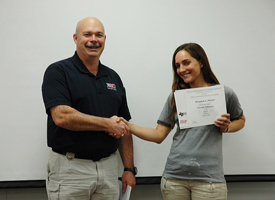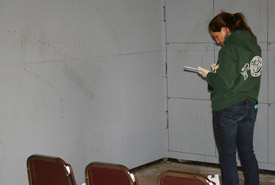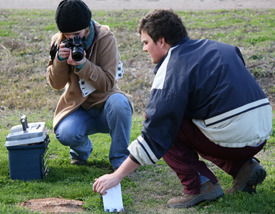
Meaghan Pimsler, right, receives her certificate from Cullen Grissom.
The Texas A&M University Forensic and Investigative Science Program and the Texas Engineering Extension Service’s Forensic Science Academy congratulates Meaghan Pimsler for completion of the training necessary resulting in her receipt of an International Association for Identification sanctioned Forensic Technician certificate.
Doctoral student Meaghan Pimsler was certified with the Forensic Technician certificate after completing the Crime Scene Investigation training session during the second week in January. The course was filled to capacity, and the selection of students permitted to enroll was highly competitive. Meaghan is the first student in 2012 and the fourth person to receive the Forensic Technician certificate since the program was initiated in 2011. She joins Amber Kendrick, Rachel Mohr and Amanda Pena as the latest to complete the 80-hour training.

Meaghan Pimsler recording notes during a mock crime scene investigation for the Texas Forensic Science Academy's Crime Scene Investigation course.
Students participating in the course were either of junior or senior level forensic and investigative sciences majors, or were graduate students that worked in either Dr. Jeff Tomberlin’s or Aaron Tarone’s labs. This year’s class included juniors Madison Gaytan, Adriana Guerra, Alyssa Laymance, Mary Lowe, Jeffrey Ng, Charity Owings, Kortney Parchman, Meaghan Pimsler, Lindsey Thompson and Alex Weghorst.
To qualify for the certificate, students must complete two intensive weeklong training sessions in Crime Scene Investigation and Latent Print Processing (visit the TEEX Forensic Science Academy for more information). Once the students pass the exams and complete coursework, they receive a certificate and are awarded four credit hours for the courses.
Some of the investigational techniques the students learned included how to take proper field notes, protecting and preserving evidence at crime scenes, photography and sketching. Students were exposed to examples from past cases for each topic covered in the course.

Charity Owings takes a photo of evidence while Alex Weghorst tags it during a mock crime scene investigation at the TEEX Prop House
After each lecture, students also received hands-on training in proper photography techniques, sketching and measuring and packaging evidence. The students then used what they have learned throughout the week to investigate a mock crime scene set up in one of the TEEX prop houses.
Pimsler said the training is important for anyone that is considering the forensic investigator field, as well as other careers in forensics. “I believe that TEEX and the Forensic Science Academy are offering a superlative service to the citizens of Texas and the United States by offering this training,” she said. “Proper certification is vital at this stage in the development of the forensic sciences, because the techniques currently employed are becoming increasingly sophisticated with advances in technology.”
Instructor Celestina Rossi, adjunct assistant lecturer within the Forensic and Investigative Sciences program, enjoyed the time she taught the group and praised the students on the amount of enthusiasm in the course.
“I think it’s incredible,” she said. “The students were all so attentive and were eager to learn. I think they have embraced the class very well.”
Junior Forensics major Katie Lowe enjoyed working with her fellow students and learning about crime scene investigation techniques. “This is great course and I learned a lot,” Lowe said.
Junior Madison Gaytan had looked forward to taking the course and loved working on the mock crime scene.“This has been a class that I have been waiting for a long time to take,” he said. “I loved it. It’s a great class.”
Pimsler enjoyed working with the Academy and plans to continue working on her Ph.D. and stay in the forensics field.
“I hope to continue my training in the forensic sciences, as well as my work on my Ph. D. here at Texas A&M University, so that I can develop techniques and tools to better assist peace officers and defense counsels in the future,” she said. “ I believe that I am in a unique and enviable position to receive cutting-edge training in the forensic sciences, and I extremely grateful to TEEX, the Forensic Science Academy, and Texas A&M University for the opportunity.”
The Forensic and Investigative Sciences degree program at Texas A&M prepares students for careers that involve the collection, preservation, processing and use of evidence and information to solve problems. These careers include law, medicine, homeland security, public safety, political science, environmental quality, agriculture, public health, chemistry, anthropology, physics, computer science and business.
The partnership between the academic Forensic and Investigative Sciences program within the Department of Entomology the vocational training provided by the TEEX Texas Forensic Science Academy is an example of a multiagency partnership putting students first. This partnership between faculty and students of TAMU’s Forensic and Investigative Sciences program and experts from TEEX’s Forensic Science Academy continues to strengthen the curriculum at Texas A&M and offer students an opportunity to participate in cutting-edge technologies and current field methods.